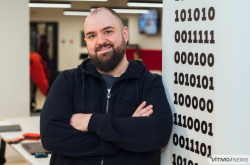A team of experts led by Prof. Alexander Boukhanovsky developed a multi-level program for professional training in AI for higher education; over the course of two months, participants attended video lectures on AI, completed assignments and tests, and participated in online consultations and live streams with AI experts. By the end of the course, they were able to employ modern-day tools and approaches to work with AI, educate their students on how to use AI for practical cases, and create educational products with its help.
“In our educational system, universities compete with one another, including for talents and resources; there are few opportunities to collaborate and pool our capacities. Our course with Alfa-Bank is one of such events when teachers from all around Russia may exchange ideas and work together. If we wish to drive the AI transition rather than being a passive observer, there should be more programs like ours,” noted Daria Kozlova, the Director for Strategic Development at ITMO.

The course by ITMO and Alfa-Bank. Photo by Dmitry Grigoryev / ITMO.NEWS
The organizers received over 1,500 applications for the course; 160 people joined the course, and 155 of them (29 teams from 52 cities in Russia and Kazakhstan and 75 universities) made it to the end. The course was taught by experts from a range of fields, including history, law, IT, philology, creativity, finance, physics, and many others. The final presentation took place at ITMO University. All course graduates received state-recognized certificates of professional training.
“With AI changing yearly, we must continually upgrade our knowledge and skills because it will impact each sector to varied degrees. The main results of the course are still to come when lecturers pass on their expertise to their students,” said Alexey Kashirin, the Director of the Center for Advanced Analytics at Alfa-Bank.
The course was divided into three sections: Introduction to AI (basic; for methodology specialists, educational program managers, and lecturers in humanities and natural sciences); AI Technologies and Applications (intermediate; for lecturers in business informatics, mathematics, programming, and managers of IT educational programs), and AI Training at University (advanced; for lecturers in AI, machine learning, generative AI, and recommendation systems).
The final projects developed by participants focused on creating an AI-assisted educational program (basic), implementing the life cycle of building an AI model (intermediate), and developing an educational program for training AI specialists (advanced).
The course by ITMO and Alfa-Bank. Photo by Dmitry Grigoryev / ITMO.NEWS
One of the teams designed a curriculum for the program AI for Prosecution Services. In this field, AI can accelerate the processes of drawing up paperwork and updating materials for classes, as well as potentially change the management structure and labor organization system in the legal community.
Another project, Pricing Modeling in the Housing Market, predicts changes in real estate prices using machine learning to analyze ads. In applied mathematics, AI is utilized to identify patterns in economic events using massive data sets, as well as to model the development of oil and gas fields.

Alexander Boukhanovsky. Photo by Dmitry Grigoryev / ITMO.NEWS
“Our course is tailored for qualified customers of educational AI systems and technologies. Why call teachers “customers”? To begin with, you order products from your students: you go to them, tell them what you want them to do, and then evaluate the outcome. Additionally, you serve the same role with your fellow teachers when you work on joint educational products. Finally, you order new goods and systems for AI in education, to name a few,” said Alexander Boukhanovsky, the head of ITMO’s School of Translational Information Technologies.











